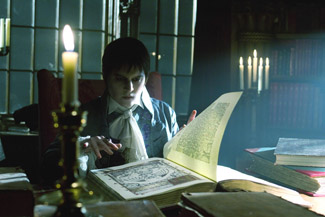|
|
Movie Review: Dark ShadowsBy Matthew HuntleyMay 17, 2012
Above all, the movie’s plot has too many unanswered questions. I walked away wondering whether Maggie was a supernatural extension of Josette. In a flashback, we learn she used to talk to the ghost of Barnabas’ lover, but how do you explain Maggie and Josette looking like each other? And after Barnabas discovers a secret about Roger, what are we to gather from it? Is Roger really David’s father? Speaking of fathers, where’s Carolyn’s? During a scene in which Alice Cooper performs as the musical guest, Carolyn hints about her father’s whereabouts and there’s an exchange between her and Elizabeth, but the movie doesn’t take it beyond that. And why does the ghost of David’s mother have the power that she does? Or why is Angelique vulnerable the way she is? All these questions give the movie a feeling of disjointedness and frustration. It introduces all these random ideas and developments without explaining them in the context of its own world. Another thing was the depiction of the 1970s itself, which is the most archetypal of that era. From the pop culture references, to the posters and memorabilia hanging up in Carolyn’s room, to the music selections in between scenes, it all felt too typical of that decade, right down to a group of hippies. This gave the movie a sitcomish quality that it should have strived to rise above. The trailer for Dark Shadows made it look like a quirky and darkly funny experience, and it is that, but at too few points. It’s mostly perplexing and unimaginative. Depp is his usual droll and soft self, and if there were any reasons to see it, they would be his facial expressions, reaction shots and line deliveries. Depp we’re on board with, but the filmmakers are unable to turn the overstuffed narrative into something we care about or respond to. We grow weary instead, which is something we don’t expect given the caliber of talent in front of and behind the camera.
|

|
|
|

|
Friday, November 1, 2024
© 2024 Box Office Prophets, a division of One Of Us, Inc.


